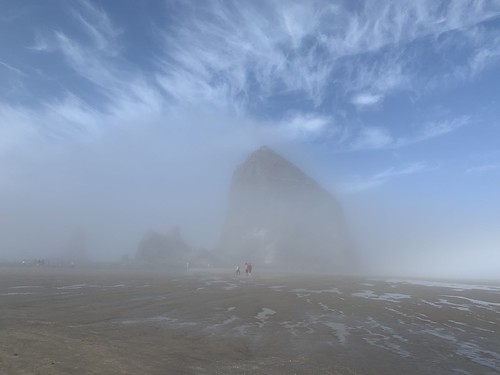Doing an internship through Oregon Seagrant has been an incredible experience. Working alongside the Haystack Rock Awareness Program and Friends of Haystack Rock has provided me with invaluable experience. Approaching the end of the internship feels a bit bittersweet. I am excited to see the manifestation of my project, but I’m also fully aware that the days of watching the puffins jump off of the Haystack Rock are coming to an end.
Through this internship, I’ve been able to learn a lot about people’s passions regarding nature. Throughout the summer I have spoken to many people that have shared stories about what the tidepools looked like when they were younger or about how their love for the outdoors always leads them back to the rock. I’ve learned that many people have traveled all around the world, but Haystack Rock remains special in their hearts. They often talk about how they came as kids, and how they ended up bringing their own kids. While I’ve learned a lot about the marine environment and species identification, I’ve also learned that Haystack Rock is also home to many people and that’s why its protection is important. It has been mentioned to me time and time again that there is a feeling of hopelessness a feeling that there is little they can do as individuals to help. I’ve realized it is a common notion to feel helpless and alone when it comes to the state of the natural environment, however, we have this feeling as a collective. Collective hopelessness, about individual impact. I believe that through effective methods of science communication, this feeling can transform into a feeling of collective hope and community. Science communication is more than just making research more accessible, it is also a way to bring people from all different backgrounds together for the things that matter.
Something that surprised me this summer was the large disparity between female and male volunteers and staff. I noticed that the majority of the staff and volunteers were female and as introductions were being made and I attended meetings, I realized that most of the people I was meeting were women. This was something that made me feel empowered because throughout my college career I have felt imposter syndrome because of the lack of representation within stem for women and people of color. Seeing women in the different positions and involvement in marine conservation provided me with a great perspective and a better sense of the different roles I can see myself in, in the future.
If I could start the internship again with what I know now, I would start by asking more questions in the beginning. I would give myself the flexibility to be more curious about my project and not just take it as a set of tasks that need to be completed. While I wouldn’t really change anything about my approach to the project, I would make sure to give myself the room to feel the confidence and comfort I feel coming towards the final weeks of the internship. Confidence is something I’ve always valued, but it is something that I know comes with practice.


